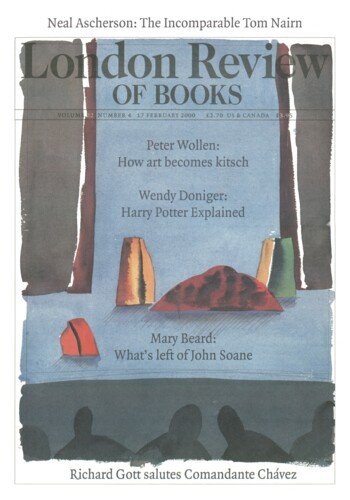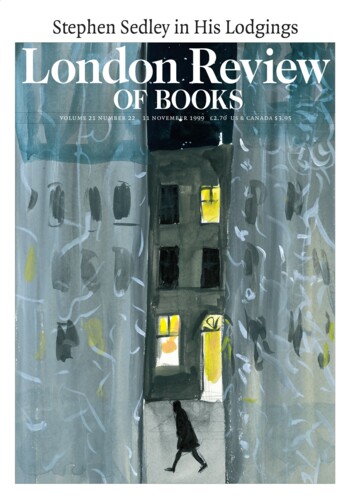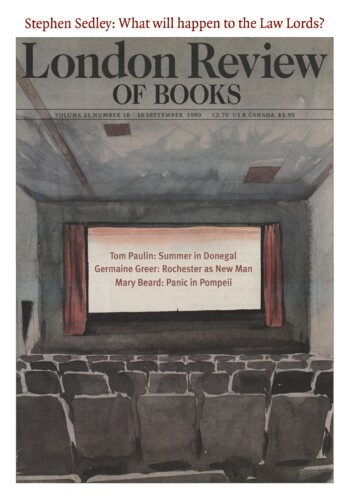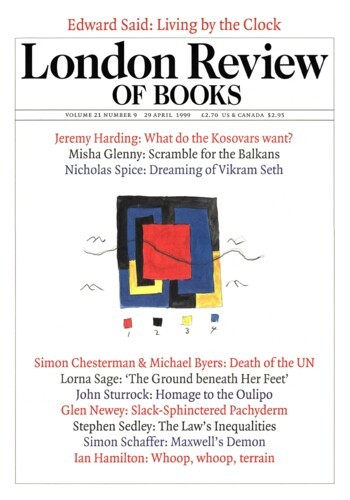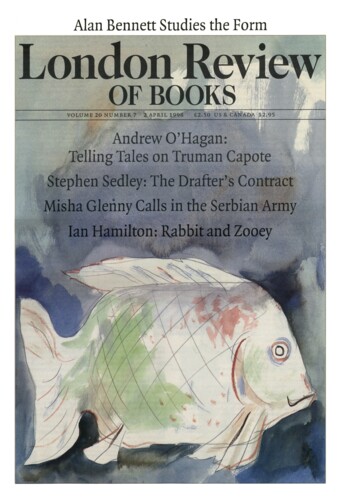Stephen Sedley
Stephen Sedley is a former judge of the High Court and the Court of Appeal, and visiting professor at Oxford.
Diary: Judges’ Lodgings
Stephen Sedley, 11 November 1999
In the pocket of my dinner-jacket, because I can’t bring myself to throw it away is a slip of paper bearing in a neat italic hand the words ‘I expect you have remembered to ask the Bishop to say grace.’ It was passed to me some years ago during pre-dinner drinks at the judges’ lodgings in Lincoln by the butler, who had sensed that, though formally in charge, I was not to the manner born.‘
Where will the judges sit? What will happen to the Law Lords?
Stephen Sedley, 16 September 1999
When, some years ago, the Bar’s dining room at the House of Lords was closed and barristers appearing before the Law Lords were given permission to use the Peers’ dining room, younger barristers became quite badly disoriented by seeing elder statesmen who they were confident had been dead for many years lunching at the next table. What they didn’t always appreciate was that it was thanks to a similar cryogenic process that the Law Lords themselves were hearing appeals – as they still are. When the Victorians set about rearranging the legal furniture, they legislated to abolish the appellate jurisdiction of the Upper House (a particular anomaly at that time, since it was only by convention that non-lawyers in the House abstained from sitting on appeals). They created a Supreme Court with a Court of Appeal at its apex for England and Wales, leaving Scotland and Ireland with their own separate systems. Limiting the majority of appeals to a one-stop process seemed a logical way of professionalising the judiciary and saving costs. The Supreme Court of Judicature Act, abolishing the Lords’ appellate jurisdiction, was accordingly passed in 1873; but before it came into force, in 1876, a further Act was pushed through, against the advice of both the Liberal reformer Lord Selborne and the Conservative reformer Lord Cairns, restoring the Lords’ nationwide appellate jurisdiction (apart from criminal appeals from Scotland) and creating the office of Lord of Appeal in Ordinary to ensure that only real judges would sit in future. That it was, in Robert Stevens’s words in the Dickson and Carmichael volume, ‘the work of a group of right-wing Tory MPs who cared nothing for law, the courts or litigants, but were anxious to prop up the hereditary principle by creating a group of judges who might balance the bishops’ is of less importance now than the fact that the Appellate Committees of the House of Lords have established themselves as one of the world’s major constitutional courts.’‘
How Laws Discriminate: The Law’s Inequalities
Stephen Sedley, 29 April 1999
‘One law for the Lion & Ox,’ wrote Blake, ‘is oppression.’ He was describing in his oblique way what Anatole France a century later described more brutally as ‘the majestic even-handedness of the law, which forbids rich and poor alike to sleep under bridges, to beg in the streets and to steal bread.’ France’s English contemporary Lord Justice Mathew made the point in more genteel terms: ‘In England,’ he said, ‘justice is open to all, like the Ritz.’ The Early Victorian poet Thomas Love Peacock had noted the unequal impact of the Sunday observance laws:‘
This beats me: The Drafter’s Contract
Stephen Sedley, 2 April 1998
‘So, then,’ says a founding father, quill poised, to the founding fathers around him in Gary Larson’s cartoon, ‘Would that be “Us the people” or “We the people”?’ If deciding what to write is tough, interpreting what gets written is tougher. Turgid texts need unravelling; obscure provisions need deciphering; occasional nonsense needs correcting; perfectly clear texts may be impossible to apply to novel situations. These and other quotidian exercises are the subject of judgments and commentaries which try to bring ordered methods to bear on the translation of a text into an outcome – that is to say, on trying to give a law its proper effect.’‘
Pieces about Stephen Sedley in the LRB
Here come the judges: The constitution
Conor Gearty, 4 June 1998
At Sunday mass in my North London parish there was recently imposed a ‘New People’s Mass’. It came suddenly and without warning. One week, we were all enjoying versions of the...
In a narrow pass
Derek Hirst, 19 November 1992
Stephen Sedley and Lawrence Kaplan seek to map a new course for the post-socialist Left, and to turn attention away from that beguiling but now exploded theme, egalitarianism. The long fixation...
Read anywhere with the London Review of Books app, available now from the App Store for Apple devices, Google Play for Android devices and Amazon for your Kindle Fire.
Sign up to our newsletter
For highlights from the latest issue, our archive and the blog, as well as news, events and exclusive promotions.
